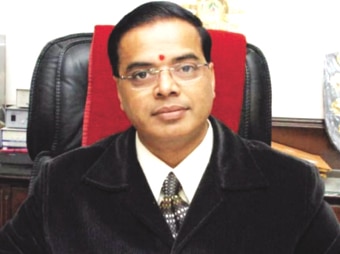
 Billabong High was created with the aim of firing the imagination of children. The ultimate goal is to create a funfilled and rewarding learning experience. The school aims to develop a system of learning that allows children to become thinkers, innovators and problem solvers. Shyam Agrawal, Principal, Billabong High International School, Indore, in conversation with Amriteshwar Pathak shares his insights
Billabong High was created with the aim of firing the imagination of children. The ultimate goal is to create a funfilled and rewarding learning experience. The school aims to develop a system of learning that allows children to become thinkers, innovators and problem solvers. Shyam Agrawal, Principal, Billabong High International School, Indore, in conversation with Amriteshwar Pathak shares his insights
Please share your remarkable journey from being an educator to being a principal.
It has rightly been said, “The more you lose yourself in something bigger than yourself, the more energy you will have.” I have always heard that great strength comes from undertaking of great responsibilities, but in my case it went in a very different way. The great responsibilities that I shouldered on became my great strength. As a person I was exposed to all the genres of this field. I had worked as Vice Principal at Imperial Academy and as Sr Vice Principal at Queens’ college, Indore, for 14 years and then I began my journey as a principal at Advanced Academy in the year 2005. Today the school has reached the pinnacle of success. It has established itself as a premier institution in a very short span of time in Indore. Recently, I joined Billabong High International School Indore as Founder Principal, which is an upcoming school of the town.
What are your views on the new evaluation practice like continuous and comprehensive evaluation of children over the traditional practice?
Change does not necessarily assume progress but progress definitely requires change. Education is essential as education has the unique ability of creating both, new wants and the ability to satisfy them! Everything has its pros and cons, but being an optimist and a visionary let’s begin with positive aspects. This is a tool through which every child can be evaluated as a unique individual. Traditionally we used to declare result on the basis of question papers, without considering the performance of the child throughout the year. With CCE, the child is assessed not only through marks on external subjects, but also on basis of overall attitude. In this system there are no formal examinations till class eighth and continuous assessments through worksheets, projects, discussions and oral evaluation conducted externally reduce the stress, and discourage rote learning tendency amongst the students. Every child individually shows his potential and calibre according to his ability and understanding in various skills. Every change needs time to be absorbed, so the parents should understand this first and support the system by seeing development of their children and teachers to motivate their students by seeing their growth in a particular skill.
 Challenges being addressed by these technologies over the next few years:
Challenges being addressed by these technologies over the next few years:
• Complementary contributions of formal learning structures and informal approaches to learning.
• The rapid changes and the need for stability.
• The tension between our social status on demand of industrial era and the new styles of learning, emerging with information technologies in knowledge societies.
• The need to ensure the use of technology for learning to enhance our opportunities and empower us and not to dominate our lives or completely take over.
How has training being imparted to the teachers on a continuous basis?
The only person who is educated is the one who has learned how to learn and change. Education is not preparation for life; education is life itself. As a human, the learning never stops and I strongly and affirmatively believe in it. I try my level best to train my teachers by various interactive activities. I believe that every teacher must receive proper training to instil fundamental values and capabilities in his or her students. The teacher must serve as a facilitator for learning and be a role model for children and the community at large. The centre of any educational endeavour is the teacher. All teachers are constantly trained on the latest techniques and lessons appropriate for their classroom.
How do you see the role of Information and communication technology (ICT) in pedagogy and administration? What is the level of ICT implementation in the school? Please share the challenges that are being addressed by these technologies?
The current world is undergoing significant and rapid changes and the teaching and learning styles will need to evolve. Transformational technologies such as ICT have profound implications for learning and learning systems. With the help of ICT academic discipline and the teaching and learning process can be done at a higher level. We need to continuously enrich and improve our learning systems through experience, innovations and research. We have to advance ourselves with advancing era of technology.
The level of ICT implementation in the school needs to improve upon relevance of curriculum, learner friendly textbook contents, innovative transaction strategies, implementation of technology driven classrooms, teaching learning to learn, continuous and comprehensive assessment techniques of testing and continuous empowerment of teachers.
CBSE has announced proposal for open-book examination system in Standards X and XII Examination?
Where school examination ends real life begins. In school, we were taught a lesson and then given a test. In Life, we are given a test that teaches us a lesson. Proposal of open-book will lead to better student involvement in the creation of syllabus. The students will be informed about this, months earlier so that they will have enough time to go through these areas and prepare the answer to analytical questions rather than mechanical queries. With this method there is less emphasis on rote learning or getting the coursework completed through the use of guide books. Students learn to navigate with skills and practice. The current proposals for education reform aims to boost the second, by undermining the first. In an openbook exam, the student has diminished incentive to familiarise himself with the subject matter ahead of time, as it is available for reference during the exam. To implement this system, it should be tested on various parameters from the administration point of view.
Please share the innovations done by the school in last five years. Where would you like to take your school in near future?
Billabong High International School has 24 branches in India and in Maldives and Dubai. The institution is constantly endeavouring to bring about improvements in its curriculum. It is the first, unique LRQ model, which is based on Learner-Centric Approach in which all teachers are empowered with strategies so that they can cater to different styles of learning. An optimum teacher-child ratio supports the learner-centric programme. We have research based curriculum in which a team of instructional design experts along with a team of educationists design the curriculum to cater to the needs of 21st century learner. The curriculum is interdisciplinary and theme based to help students grasp complex concepts and to encourage long term retention and understanding. We use Bloom’s Taxonomy to foster higher order thinking skills like application, exploration and creativity in students and superior quality standards in which all the five domains that is Teaching, Learning, Administration, Environment and Leadership of the schools are maintained.




















